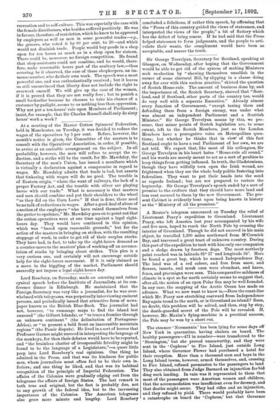At a meeting of the Master Cotton Spinners' Federation, held
in Manchester, on Tuesday, it was decided to reduce the wages of the operatives by 5 per cent. Before, however, the month's notice is given, the Committee of the masters is to consult with the Operatives' Association, in order, if possible, to arrive at an amicable arrangement on the subject. hr all probability, however, the men will refuse to accept the re- duction, and a strike will be the result, for Mr. Mawdsley, the Secretary of the men's Union, has issued a manifesto which is virtually a declaration against a compromise in regard to wages. Mr. Mawdsley admits that trade is bad, but asserts that tinkering with wages will do no good. The trouble is of Eastern origin, "where the want of railways, the lack of a proper Factory Act, and the trouble with silver are playing havoc with our trade." What is necessary is that masters and men should combine and put their shoulders to the wheel "as they did on the Corn Laws." If that is done, there need be no talk of reductions in wages. After a good deal of abuse of a section of the employers "who have raised themselves from the gutter to opulence," Mr. Mawdsley goes on to point out that the cotton operatives were at one time against a legal eight- hours day. They would have continued in this opinion, which was "based upon reasonable grounds," but for the action of the masters in bringing on strikes, with the resulting stoppage of work, in order to get rid of their surplus stocks. They have had, in fact, to take up the eight.hours demand as a counter-move to the masters' plan of working-off an accumu- lation of stocks by bringing about strikes. This plea is a very curious one, and certainly will not encourage outside help for the eight-hours movement. If it is only claimed as a move in the higgling of the market, Parliament should assuredly not impose a legal eight-hours day.


































 Previous page
Previous page